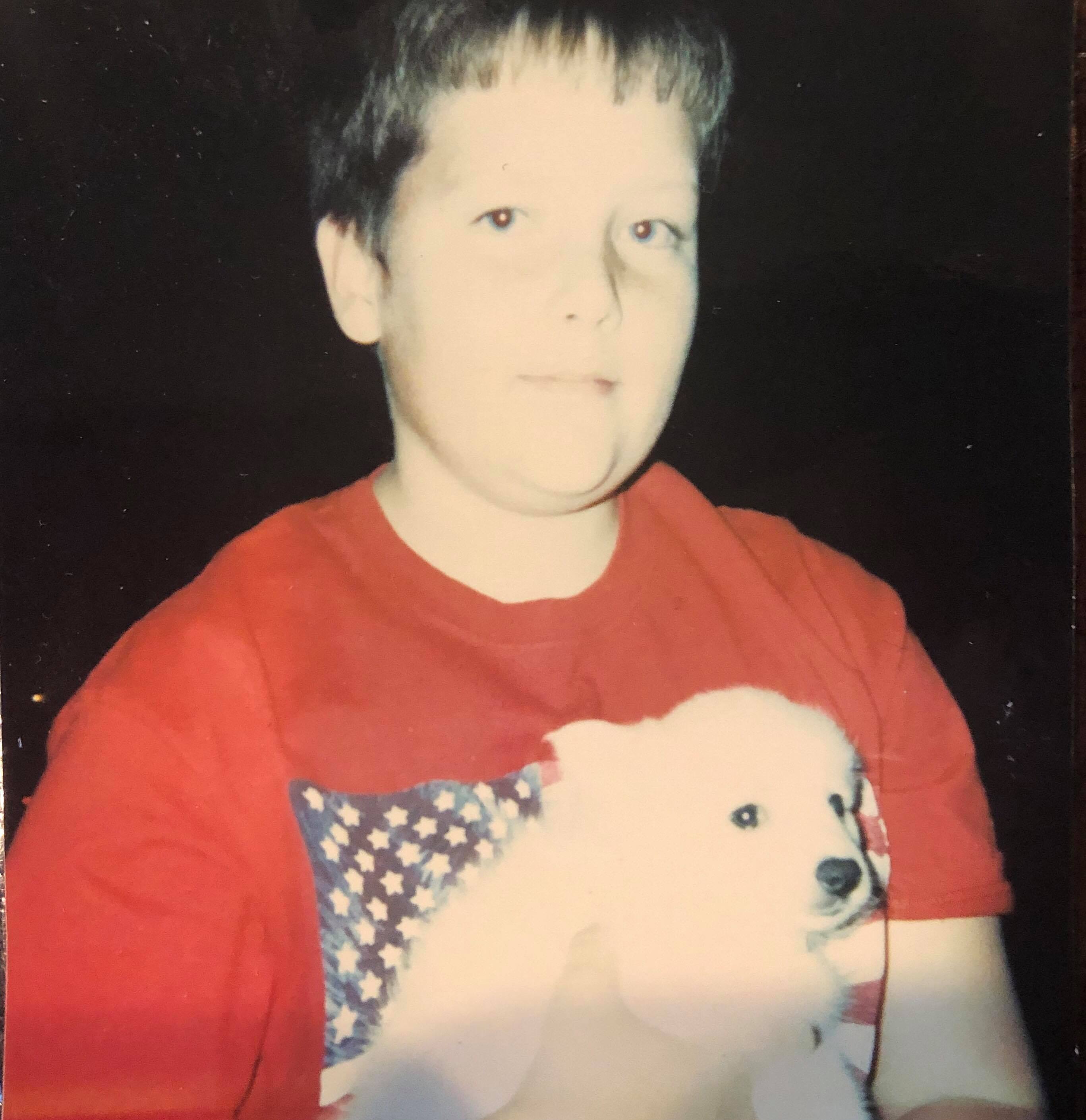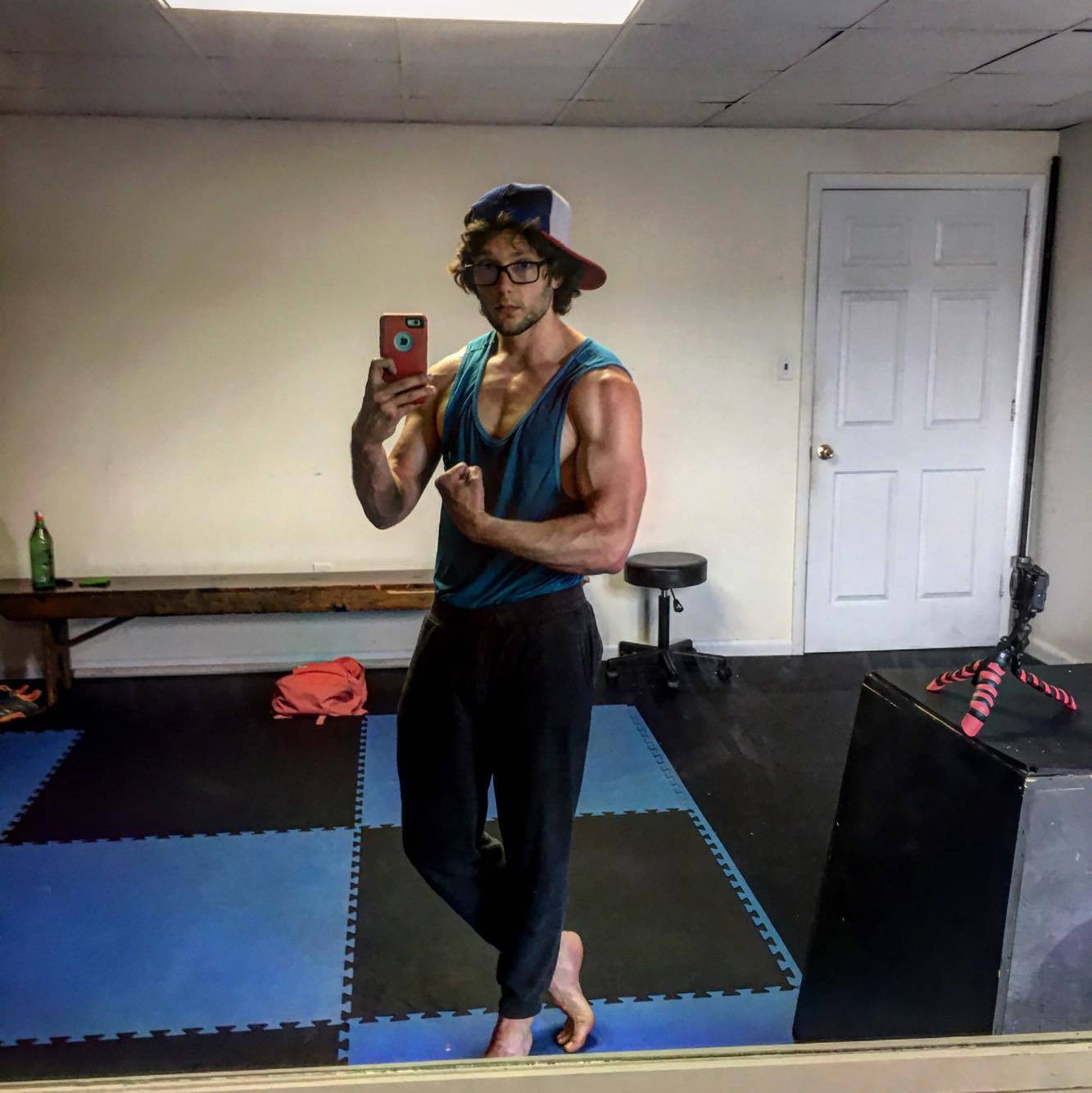
Fitness Suggestions From a Former Fat Kid
OR, ==> CLICK HERE TO DOWNLOAD THE EPISODE.
Here’s a picture of me from the seventh grade. Following that is a picture of me now. The first picture was not at my heaviest. That came a year or two later.


Most of my life I remember being the heavy one in my group of friends. I wasn’t the only heavy one, but most of my friends were pretty athletic and skinny and good at skateboarding. In typical boyhood fashion, I was bestowed with a number of nicknames: Porker being the one that eventually stuck. Say what you will about the general ineffectiveness of shaming (I think it’s true), but if only in my limited example the teasing of my friends gave me a strong incentive to change. I regularly ruminated on their remarks. They were just the kind of thing that kept me up a night. That and thoughts about being a famous musician.
But even more prodding than the jabs of my peer group was the advice I got from my doctor in the eighth grade. “Do something about the way you eat, or accept that you might have a heart attack by the time you’re fifty.”
She wasn’t being mean about it. And she wasn’t trying to hurt my feelings, either. She (my doctor) just wasn’t going to pretend as if I could be healthy at any size. She cared enough to be straightforward with me. And, for the most part, it worked.
Not long after that appointment, I found my way into a Tae Kwon Do studio. I was at the time far too timid and mealy-mouthed to have walked into the high school weight room. That’s where many of my friends were — you know, the athletic ones. No doubt they would have chortled at my entry and suggested I must have gotten mixed up on my way to Kopp’s Custard or something. I didn’t want to deal with that. So, I began my fitness journey at a place I figured no one — or at least no one I knew — would notice: In a dojang.
My coach at the time, a tall, strong and athletically accomplished martial artist, was tough on me, but always fair. He called me out on my lack of personal responsibility and obvious laziness. He pushed me. He held me to a standard. Nobody had ever thought of doing that for me before; probably nobody thought it would have been worth doing. Whenever I was previously challenged in life, my natural impulse was to simply quit, and nobody ever seemed to have a problem with me doing that. Virtually every sport I ever joined I stopped participating in within two or three weeks. Soccer, basketball, football, whatever. This was the first, real time in my life that I was actually sticking to something demanding, at least in the physical sense.
But quitting Tae Kwon Do wasn’t exactly an option, since I pleaded with the owner to work in exchange for training. I didn’t have the money to pay tuition, so I scrubbed toilets and helped with the kids’ programs that I might stay after for private lessons with the other instructors. This meant I had skin in the game; a commitment based on honor and not wanting to disappoint someone I now seriously looked up to. This was a novel concept for me as a young man.
Anyway, we’d start our nightly instructor training session with a pretty vigorous workout. I was always the weakest, and never quite knew how to move. Then we’d spar. And there I was always the slowest and most inflexible and easiest to defeat. I’d get knocked in the head a lot, and submitted on the mat constantly. But my coach kept pushing me and kept pitting me against his best.
Eventually I acquired skill, if only because I had to. I gained strength and flexibility and speed. I also started to see a considerable amount of body fat dropping off. From this, my confidence and curiosity increased. I started asking questions — serious and deep, probing questions — about nutrition and strength training and all that sort of thing. I was given a lot of fundamental answers to fundamental questions. The people I was learning from were strong and determined students of physical culture. They knew what they were talking about. I was lucky to be around them.
For the first time in my life, I began to form some healthy habits for myself. I started making protein shakes and eating vegetables and prepping meals, and gave up a lot of foods I previously loved but knew weren’t doing me any good, like breakfast cereal. I even got consistent with training on my own, collecting weights in my garage along with a punching dummy. Eventually I began winning sparring matches, and even did fairly well in a couple of tournaments. What I realized is maybe I wasn’t such a loser after all. Maybe I’d just been making less-than-ideal decisions in life.
Fast forward a couple of years and college eventually came, and there I met my new coach and now close friend Som Sikdar. He’s the one that got me into kettlebells. At this point I was heavily into fitness and martial arts, and was obtaining certifications and training people to pay my way through school.
None of these habits, by the way, formed overnight. It was consistent, daily effort, with a lot of trial and error, and quality coaching that fundamentally transformed everything about my life. I was that classic overnight success ten years in the making.
I especially remember the first time I saw one of my abs popping through under that last thin layer of fat. This is something I never thought would happen — not in my wildest fantasies did I think I, Pat Flynn, could ever have a flat, firm stomach, let alone a set of sharply defined abdominals. This was crazy. Obviously I snapped a picture. (It may have been more than one). That said, it wasn’t so much the emergence of these physical features that astonished me, but rather the now undeniable physical evidence that I could actually accomplish something I never thought possible only a few years before. This gave me a fresh, new sense of self. This confidence would soon enough carry over into me starting businesses, getting books published, and speaking places. I can trace nearly every one of my life highlights back to a few simple lessons learned in the weight room.
If there’s a point I’m trying to make, it would probably be this: I get what it’s like to be overweight, to struggle with eating decisions and an unhealthy relationship with food. I also know what it’s like to be picked up on by others. Believe me. I’ve been there. It isn’t fun. (But it sure does grant a wonderful sense of catharsis years later when all those same people are now asking you for workout advice. Of course you give it to them. Pettiness never pays).
But I can solidly and enthusiastically affirm that anybody can find their way into a healthier lifestyle who really wants to. Aristotle talks about our capacity to acquire virtue. That we all have by nature the ability to form ourselves in such a way to exhibit temperance and fortitude and justice and courage and so on. But we have to work at these things; they don’t come automatically, like eyesight or the color of our hair. That’s the thing about virtue: It needs to be worked at. And for some of these virtues — temperance and fortitude, especially — the gym is the perfect place to start. So, as it happens, is the kitchen.
But know this. Healthy habits are like a well-formed tennis swing. They don’t establish themselves instantly, which means they’re something you have to repeatedly practice. You can also expect a lot of misses — a lot of mess ups with training and eating — just as you would if you’re playing tennis, or running scales on the piano. In fact, you’ll probably have more misses than hits at first. And that’s OK. It’s all part of the process.
The first advice I can give as a former fat kid –and perhaps the best — is to be OK with making a mess. Be OK with slipping up and not having everything go perfectly, at first. Just don’t be OK with not making an effort. Never accept total defeat or an all-or-nothing attitude. Think, “always something,” instead. Treat everyday as if it’s Day One; a new opportunity to learn and develop yourself and explore things. Hold yourself to a standard, and hire coaches who will do the same. But also be quick to forgive when things don’t go as planed. This isn’t the same as making excuses. Accept when the fault is on you, which most of the time, it will be. But learn from those mistakes and then learn to move on. Acknowledgement of mistakes and the ability to forgive (especially yourself) is a powerful method of self-improvement. Attempting to rationalize –that is, making excuses for stuff you know you should have done but failed to follow through on — is itself a mistake.
Finally, surround yourself with people who lift you up, rather than lower you down. Hang out with positive, encouraging, but realistic people. Listen to positive, encouraging, but realistic podcasts. (I can think of at least one.) And read positive, encouraging, but realistic books (start here, maybe?).
Don’t let contamination seep into your environment. If something horribly nasty creeps in through the ventilation shaft, sweep that sucker out as quickly as you can. Here is where prayer and medication can help. The physical must be aided by the spiritual – that’s another major lesson I’ve learned.
Finally (second finally) get really, really good at the basics. You want healthy habits to become, well, habit, so you don’t always have to “think” about what you’re eating, or when. We want nutrition to be like brushing our teeth — just something we do at a certain time automatically. Eat plenty of colorful vegetables and fresh fruits and healthy fats. Limit sugar, snacking, and alcohol. Get your protein up. Also have some sense of where your calories are at, and maybe sneak in the occasional intermittent fast. Track and log everything, at least starting out. These are the things that matter most, and they also happen to be the most simple and straightforward.
Remember: being healthy is about making a daily effort toward a number of basic actions. Like writing or playing the guitar or being a genuinely nice person, all good habits are the result of repeated and intentional –and often mundane — activity. I cannot emphasize this point enough. Even if you get a lucky hit in tennis here or there, that does not a competent tennis player make you. Only issuing so many serves and volleys a day can do that.
Like Dan John says, “If it’s important, do it everyday.”
Recommended Resources
The Pat Flynn Show – my podcast covering fitness, nutrition, business, writing, spirituality/religion, and more.
How to Be Better at (Almost) Everything – my little, green book on stacking skills and finding focus and discipline.
101 Free Kettlebell Workouts – a free, all you can eat buffet of my very best kettlebell workouts.
…
EP 118: Using Strategic Meal Replacements for Safe, Sustainable Weight Loss [The Pat Flynn Show]
Beautifully explained and written Pat. Any journey involves daily commitment. If you’re walking across the U.S., you won’t get far unless you commit to x miles a day and do so on a daily basis. This applies with fitness, the acquisition of knowledge and skills, and character development. Anyone can do well for a few weeks but the true victor is the person who puts in the effort every day on a regular basis. There will be days when you struggle and even days when it doesn’t happen, but if those are the exception rather than the rule, you’re going to be in good shape. I know when it comes to fitness and health that results are a powerful motivator. Like your own experience, it’s so encouraging when you see fat disappear and you feel stronger and more energetic. It doesn’t happen overnight but if you commit, you’ll be fit (hey, I might trademark that). It often happens faster than we think too, much to our delight.
Pat, I enjoy reading about your fitness journey but I just can’t find the motivation or the discipline (don’t know if they’re the same thing) to get started and keep going. I really want to improve my health, but I can never stick to a nutritious meal plan or an exercise plan. It gets me depressed and I eat and I repeat. I feel like I’m on a merry-go-round!